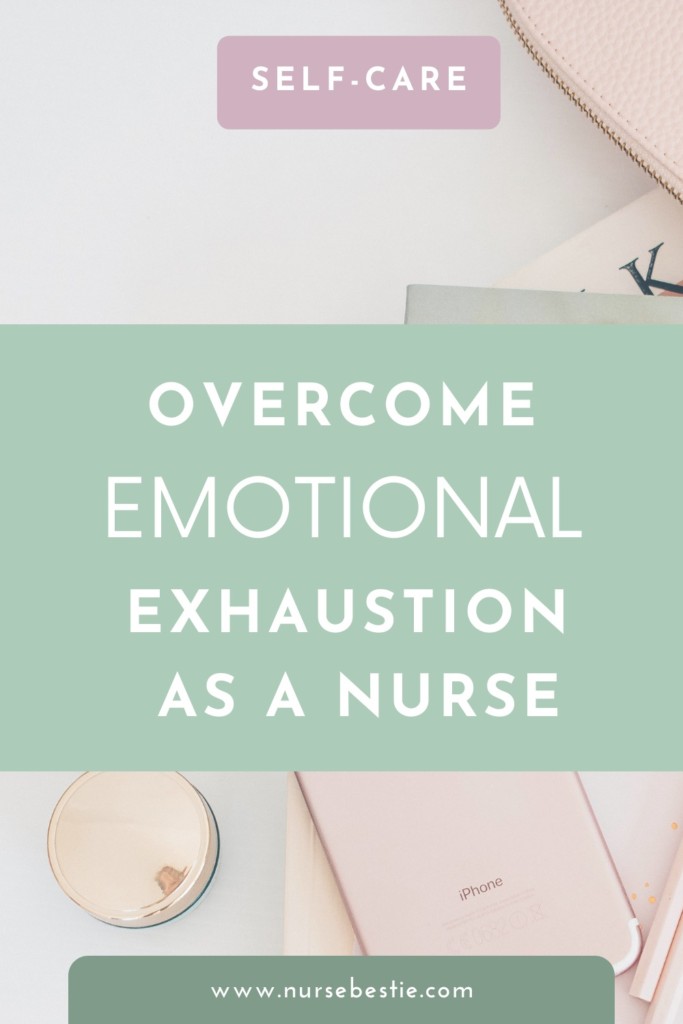In the healthcare field, nursing stands out as one of the most exhausting professions that cause emotional struggles.
The biggest consequence of emotional exhaustion as a healthcare provider is a reduction in energy and motivation. Losing your motivation to care as a nurse is extremely dangerous.
Many nurses often ask, “How can I avoid feeling drained?”
Feeling emotional depletion in healthcare is very prominent + alive, and if things are going to keep going the way they are, it’s not stopping anytime soon.
This is why it is so important you tackle the root cause of it first, instead of layering on different self-care methods without much effectiveness.
In order for strategies and methods to work on you, you must have a solid foundation set up first.
This means having a clear understanding of your triggers and gaining control over them.
To make an analogy (because I love analogies), it’s just like putting a bandaid on a wound. You’re only masking the damage, but you aren’t actually treating the wound itself.
The same goes for you, my fellow nurse.
You are so burnt out and tired, and you’re trying different things to help, but you aren’t tackling the reason you are burnt out in the first place.

What Causes Emotional Exhaustion As A Healthcare Provider
It’s time to dig deep and look inside yourself. Think about what is making you emotionally exhausted.
Some things that may spark an answer are:
- high patient load
- compassion fatigue
- sleep deprivation
- lack of support
- lack of fulfillment
If any of these things are reasons you are emotionally exhausted, remember you aren’t alone. So many nurses are dealing with emotional exhaustion, and since the pandemic, that number of total nurses has skyrocketed.
Emotional Exhaustion Explained
Emotional exhaustion is one of the symptoms of burnout.
A nurse is put into situations that aren’t typically what an average person goes through. The trauma + sorrow that certain situations make you feel, mixed with happy + excited feelings others make you feel is a lot to deal with at once.
Talk about an emotional roller coaster!
On top of that, the healthcare field isn’t the most forgiving one. When you make a mistake, it’s not always easily rectified.
Mistakes in healthcare can lead to major issues and even the death of a patient.
Needless to say, there are a lot of emotions, so nurse burnout can feel almost inevitable at some point. Some people grow accustomed to it and live day to day with this burnout. Others, like you, acknowledge it and want to overcome it because it’s not the way you want to live.
You want practical ways to overcome nursing burnout. Luckily for you, I am sharing just that today!
Ways You Can Stop Feeling Emotionally Drained
These ways to overcome emotional exhaustion are from personal experience. They have helped me tremendously in climbing out of burnout.
If you refuse to become that bitter old nurse that you definitely have come across before, then these are for you!
Create Boundaries
As a nurse or healthcare provider, you must create boundaries for yourself to protect your emotional energy.
Spreading yourself too thin is one of the main reasons nurses get emotionally burnt out. You cannot give when you are on empty!
When you take time to replenish your spirit it allows you to serve others from the overflow. You cannot serve from an empty vessel.
–Eleanor Brown
The two main ways for creating boundaries are:
- Recognizing your limits
- Being assertive
Keep it simple and focus on these two tips. You know yourself best, and do not feel like you will be judged or looked down upon if you speak up.
If something is too much for you, it is worth sharing. Once others recognize your boundaries, it can change the dynamic and the way they work around you.
Take Your Breaks
It truly doesn’t matter if you have 8 patients screaming your name demanding your time.
If you are working until exhaustion, you nor your patients are going to get much out of it.
Your emotions will be dragging on for far too long, and it can seriously make you sick.
They need time to turn off every now and then. Take the breaks you deserve and have a right to take.
Decrease Alcohol Consumption
If you find yourself coming home from your shifts thinking “I need a drink” on a continuous basis, it’s time to reevaluate.
Let me tell you, I love my wine.
But alcohol has to be consumed in moderation and not mistaken for a stress-reliever.
When alcohol has a connection to your negative emotions, the exhaustion is only going to get worse.
Alcohol dehydrates you, which is the last thing you need when you are emotionally drained. It also messes with your brain chemicals that are needed for good mental health.
Give your mind a fair shot at healing by decreasing alcohol consumption.
Understand Your Needs
A lot of my tactics have to do with reshuffling your mental outlook, mindset, and perspectives.
It all starts in the brain!
Start working on finding your needs in a workplace and what allows you to be the best nurse you can be. Is that more help from colleagues and nursing assistants? Is that a lower workload? Is that a different schedule?
Remember that no job is permanent in your life, and if a workplace is not serving you, then you must go find one that does.
Do not be afraid to explore new territory and seek what fills your cup. Life is about constantly improving yourself!

Prioritize Staycations
Whoever thinks taking PTO is for vacations only needs a reality check!
Staycations are some of the most beneficial, therapeutic things to do. Even if you have a lot on your plate in your personal life, removing work from the equation for some time will feel like a weight is lifted off you.
Staycations serve as a chance to refuel and refill your cup! It’s a vacation for you and your brain, essentially. You deserve that so much.
Not sure how to take one or what to do on a staycation? Check out this article that breaks it down!
Prioritize Healthy Work Hours
Make sure you aren’t working too many hours back to back.
If you are working 12-hour shifts, you really shouldn’t exceed doing three shifts in a row. That’s 36 hours in 3 days, and you still have 4 more days in the week.
Exceeding long work hours in a short amount of time contributes to emotional exhaustion.
Being a caregiver must be done in increments because it can easily fall into a draining pattern.
You can only give so much as a human before you need a break. Don’t abuse your gift! Being a nurse is a beautiful thing, but don’t do things that will suck the love out of it.
You are in control of this.
If your job is asking you to work overtime or pick up an extra shift, you make that decision based on how you feel. Is the money worth more than your health?
To Summarize It All…
Emotional exhaustion affects so many nurses across the board.
It is not a dead end road though. You’re very capable of pulling yourself out of it and getting to a better, healthier place.
Implementing these tips can help you be the strong, happy nurse you so desperately want to be. Start by trying out one of these tips and then keep on adding more!
Read More:
Why Being A Healthy Nurse Is So Important
10 Effective Ways To Get Fit As A Nurse
QUESTION: What is your preferred way to deal with emotional exhaustion as a nurse?
Enjoyed this post? Share it on Pinterest!





Leave a Reply